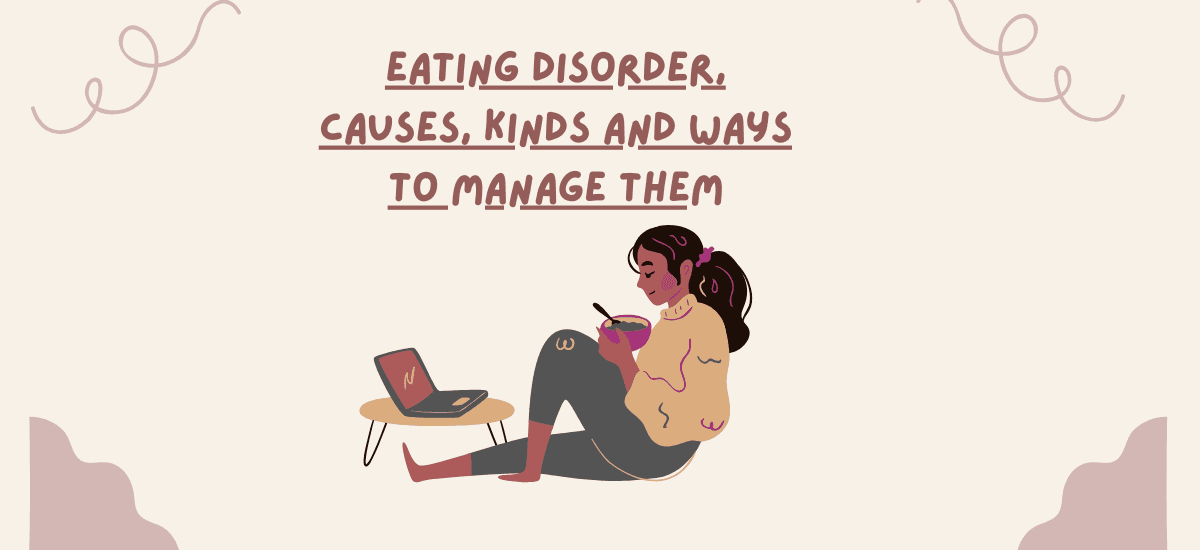Eating Disorder, Causes, Kinds And Ways To Manage Them

Do you have an abnormal relationship with food? Studies have shown that an eating disorder is not just about food but a complexity of mind that require professional help.
It’s a psychological condition that makes you obsessed with your food intake, body, and weight. In certain cases, it can even lead to fatality if ignored!
Anyone can be a victim of an eating disorder, but we find more adolescents and young women being succumbed to it. It is said that 13% of youth may experience eating disorder by the time they turn 20.
What Are The Causes Of An Eating Disorder?
Studies suggests that genetics could be a rare factor that contribute to an eating disorder.
Other factors could be personality traits such as perfectionism can eventually lead to an eating disorder.
Another important factor that needs to be addressed is your daily exposure to media that fills your minds with culture preferences or pressure to look a certain way can affect your daily food intake.
The way your brain works (levels of dopamine and serotonin) or biology can play a role in developing an eating disorder
What Are The Kinds Of Eating Disorders?
1) Anorexia Nervosa
In such cases, people tend to restrict their diet no matter how underweight they are because they consider themselves as obese or overweight. There’s also an extreme fear of gaining weight followed by a tendency to restrict calorie intake to the maximum.
2) Bulimia Nervosa
People with bulimia literally lack self-control and have the urge to eat massively over a specific period at the same time use purging behaviours like forced vomiting to restrict calorie intake. This kind is followed by several side effects such as dehydration, swollen salivary glands, acid reflux, etc. In severe cases it can cause electrolyte imbalance too
3) Binge Eating Disorder
This type unlike bulimia, the person does not indulge in any purging behaviours. Instead they eat excessively over a short period and take it as it comes. Such people are mostly dwelling on negative emotions such as guilt, sadness, fear, etc that paved way for their eating disorder. Obesity is the first and the most dangerous symptom to strike which is generally followed by further medical complications.
There are several others but we have covered the main ones.
How To Build A Healthy And Positive Relationship With Food And Overcome Your Eating Disorder?
1) Stop With Fad Diets
Sometimes certain diets can be unhealthy when you’re having an eating disorder. The more you restrict yourself from food, the higher your chances of binge eating.
Instead, switch to whole foods, such as fruits, vegetables, and grains and keep your sugar or dessert intake in check.
2) Eat At Specific Times And Don’t Skip
Manage your meal timings and keep them constant. Unhealthy food habits can get you craving for more at oddly hours despite feeling full or you may want to skip meals occasionally. One large meal can spike your blood sugar levels and hunger hormone called ghrelin to a larger extend. Instead, adhere to a three small meal plan and stick to it!
3) Mindfulness Is The Key
Listen to your body, understand it’s needs and be aware of your feelings at the moment. Studies suggests that once you practice mindfulness, you will become fully aware of your hunger pangs, improve your eating behaviour and reduce your tendency to binge eat from time to time.
4) Drink Loads Of Water
Sometimes our body tends to misunderstand thirst over hunger and a few glasses of water should make you aware if you’re hungry or not. In addition to this, water makes you feel full, boosts metabolism, flushes out toxins and aids in weight loss.
Like they say, few glasses of water hurt nobody!
5) Exercise Regularly
Many studies have proven that certain breathing exercises such as yoga and meditation not only helps to keep your body and mind in check but reduces stress, depression, anxiety and various other factors that contribute towards your eating disorder. So don’t you think it’s high time you make exercise a part of your daily routine?
6) Include More Fibre And Grains In Your Diet
Fibre rich foods are known to keep you full as it slows down digestion and reduces your appetite for a few hours. Eat more fruits, vegetables, legumes and whole grains when you feel hungry to curb your cravings.
7) Go “Mary Kondo” On Your Kitchen
If you’ve watched the show on Netflix, you know it’s a necessity to declutter those binge worthy treats in your kitchen.
Clear out anything and everything that wouldn’t do well on your body in the long run! Instead stock up those fruits, veggies and protein rich foods. Healthy alternatives are always better than junk foods that provide you with temporary happiness.
8) Sleep Well
Your sleep cycle plays a major role in maintaining your hunger pangs and if you aren’t getting proper sleep, chances are that you will land up binge eating the morning after. Proper sleep lowers leptin hormone levels that is responsible for promoting fullness. Sleep also has a direct influence on your body weight. So next time, try to incorporate those 8 hours of relaxation to reduce any tendencies of binge eating.
9) Keep A Food Journal Or Tracker On Your Phone
Several apps are available that will help keep your body in check and you will learn about what you are consuming on a regular basis.
It is important to know what you eat and food journals will help you identify your potential problems and in return you will be able to progress towards working on your healthy eating goals.
10) Talk To A Friend
They say, a good social circle can help with taking your mind off things. So pick up that phone and connect with someone you can address your eating disorder to and who will stop you from indulging in anything unhealthy. Don’t have a friend to talk to? Skip to the next point…..
11) Talk To A Therapist
It’s good if you feel better with the above-mentioned tips, but if you need professional help please reach out to the CareMe Health team! We have a brilliant team of licensed professionals who are highly qualified clinical psychologists and psychiatrists, to help you deal with issues pertaining to eating disorders!
This blog is written under the expert guidance and feedback from Ms. Pooja Varma, Counselling Psychologist at CareMe Health.
Edited and Coordinated by Arathi Nair
Did You Find This Blog Informative?
We hope reading this blog has helped you understand better about eating disorders and the issues that come with it.
Do you have some more interesting facts to share?
Did you find something specific that you loved about our blog?
We look forward to hearing about your experience reading this blog!
Feel free to drop a message or send us an email at care@careme.health
Related Articles

Letting Go With Grace: Emotional Tools for Closure
Letting go is never easy. Whether we are parting ways with a loved one, ending a relationship, leaving a job, or saying goodbye to a cherished chapter of life, the emotional weight can feel overwhelming. Yet, closure is essential for our emotional well-being. Without it, we carry unresolved grief, anger, regret, or longing that can seep into new relationships and experiences, holding us back from healing and growth.

Breakup Blues: How to Cope and Rebuild Your Self-Worth
A breakup often feels like a silent earthquake—unseen by others but devastating within. The pain doesn’t just come from the loss of a relationship, but from the crumbling of the life, identity, and future you built with another person. You may find yourself questioning your worth, doubting your value, and feeling isolated even when surrounded by people. In Indian society, where emotional expression is often discouraged and breakups can be stigmatized, this pain may feel even more overwhelming. But the truth is—while breakups may shake you, they do not define you. You are not broken; you are in a process of emotional reformation. And with the right tools, guidance, and support system, you can rebuild not just your self-worth but also your entire life narrative.

Healing After Heartbreak: A Mental Health Perspective
Heartbreak doesn't just break your heart—it can shatter your sense of identity, peace, and purpose. Whether the end was expected or abrupt, mutual or one-sided, short-lived or long-term, the aftermath often leaves people emotionally disoriented. In Indian culture, where societal expectations and family involvement in romantic relationships are prevalent, the pain is not just personal—it is public. Yet, very few are taught how to heal from emotional loss in a healthy, sustainable way.

Boundaries in Love: Saying ‘No’ Without Guilt
Love, in its truest form, should be a safe space—a space where individuality is not only respected but celebrated. Yet, in many relationships, especially in the Indian cultural context, love is often misunderstood as constant availability, complete sacrifice, and putting the other person first, always. As noble as this may sound, this version of love often leads to emotional exhaustion, suppressed resentment, and the erosion of one’s identity.

Gaslighting in Relationships: What It Is and How to Heal
Gaslighting is a form of emotional abuse that erodes your ability to trust your own perception. It’s a slow, insidious process that often begins with subtle doubts and ends with complete self-questioning. In romantic relationships—especially in the Indian context where silence, compromise, and duty are often mistaken for love—gaslighting can be even harder to recognize.

When One Partner Struggles: Supporting Mental Health in Relationships
Relationships are a beautiful blend of shared experiences, emotional growth, and mutual care. But they also come with challenges—especially when one partner is struggling with their mental health. In a society like India, where mental health is still heavily stigmatized, couples often find themselves ill-equipped to handle psychological distress in their relationship.
